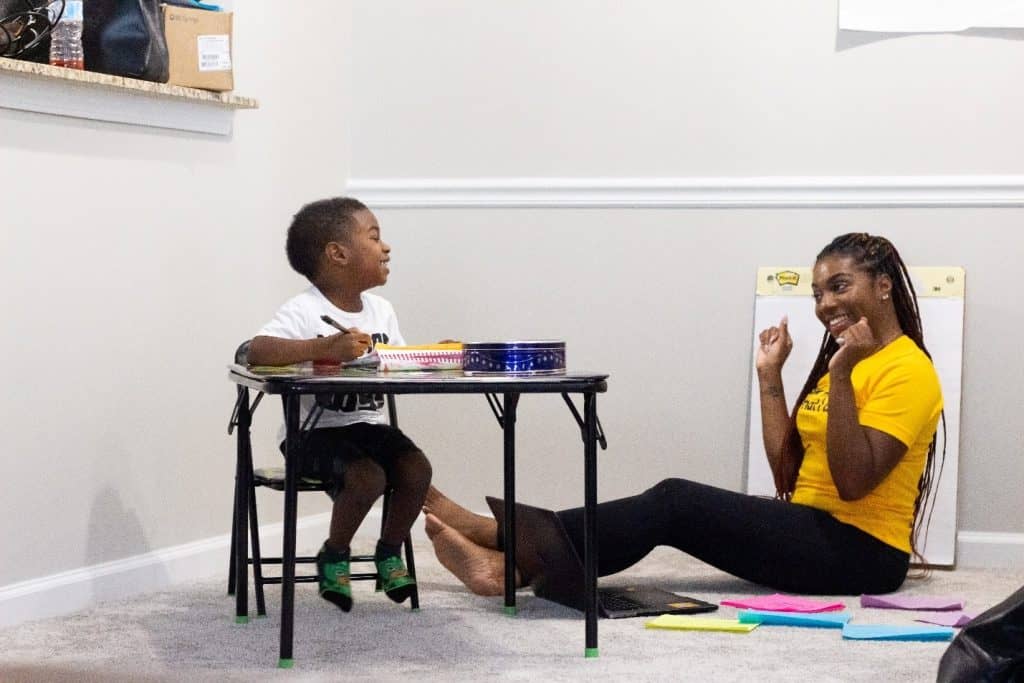Parenting itself is a full-time job, making it especially difficult for couples who still have full-time jobs themselves. Fortunately, there are professionals who can help look after children. When looking for help, it would benefit parents to understand the differences between nannies and babysitters.
There are significant differences between a nanny and a babysitter. These include their schedules, responsibilities, discipline, cost (including taxes and payment methods), qualifications, privacy, availability, and control.
| Nanny | Babysitter | |
| Schedule | Part-time or full-time, 30-50 hours a week | On-call, a few hours a week |
| Responsibilities | Care, feeding, clothing, schooling, and raising the child | Mostly just looking after the child |
| Discipline | Strict | Potentially more lenient |
| Cost | Expensive | Cheap |
| Taxes | Yes, including other employee benefits such as medical insurance and social security | None |
| Payment Methods | Employment salary | Cash or digital transfers |
| Qualifications | Degrees, certifications | None |
| Privacy | Low | High |
| Availability | Difficult to find a replacement | Easy to find a replacement |
| Control | Parents have more control over a nanny | Parents have less control over a babysitter |
This article will primarily discuss the differences between a nanny and a babysitter. Understanding the differences between the two can then help parents choose which one they need in their lives.
Differences Between a Nanny and a Babysitter
1. Schedule

Firstly, it is important to understand that parents often find help in the form of childcare personnel (i.e., nannies and babysitters) due to a variety of reasons. If they could, parents would typically want to take care of their children on their own.
One essential reason why parents typically get some help is that they need time. The time they get from someone else looking after their children is time they can use to do other things such as jobs, personal development, social activities, and so on.
Thus, it is important for parents to understand that the schedule between a nanny and a babysitter is quite different. The differences between the two make each of them have their own pros and cons.
When it comes to schedules, nannies are typically employed on a full-time or part-time basis. One could expect nannies to consistently serve anywhere between 30-50 hours a week. Nannies work this many hours on childcare because it literally is their job.
On the other hand, babysitters are typically on-call. While some families would have a regular babysitter that would come a few times a week to look after the kids for a few hours, there are families that would simply call and schedule a babysitter when needed.
The distinction is important to understand because it would really matter depending on what you need. If you need someone to look after your child because you have a party to attend at the end of the week, then a babysitter should suffice.
However, if you want someone to look after your child because you want to go back to work, then you should probably get yourself a nanny.
Another difference between a nanny and babysitter is how long they typically work with the family. Since babysitters are definitively temporary and only called when needed, the duration varies greatly from family to family.
While some babysitters can work for a family for a long time, some babysitters would experience a shorter relationship.
On the other hand, nannies tend to stay long-term. Nannies basically raise the children and are part of the family. It is quite common to find families who keep nannies even when the children have significantly grown up. These nannies would transition from childcare to family assistance.
2. Responsibilities
While nannies and babysitters both generally look after children, the scope of their responsibilities actually differs from one another. This is important for parents to know so that they have an idea of what to expect from either option.
Essentially an employee of a family, nannies have a significantly wider range of responsibilities compared to babysitters. When nannies look after children, they become almost autonomous – taking care of the kids, feeding them, bringing them to school, cleaning after them, and so on.
One could compare the responsibilities of a nanny to that of a parent themselves. They are significantly more hands-on with the children. However, they still work closely together with the parents to ensure that the nanny delivers the preferred parenting method of the parents.
On the other hand, parents cannot expect the same level of duties from a babysitter. Babysitters are often called to simply make sure that the children are safe and up to no good when parents have to leave the house for a few hours.
Compared to the hands-on relationship between a nanny and a child, experience with babysitters could vary. There are some babysitters that play with the kids and help them with their homework, while there are some babysitters who would simply be in the same room as the child.
One way to describe the difference in responsibilities between nannies and babysitters is that while babysitters would simply look after the child for the necessary hours, a nanny is raising the child. Raising the child includes making sure they develop well.
Lastly, you can expect babysitters to potentially be more lenient with children compared to nannies. Since babysitters are short-term, they can get away with lapses in discipline. On the other hand, nannies have to be more resolute when it comes to rules in the house.
3. Cost

It may seem that nannies are obviously better than babysitters since they stay longer hours and perform more duties. However, it should come as no surprise that they are significantly more expensive than babysitters.
According to this survey, the average cost of a nanny is $17.35 per hour per child. On the other hand, this study shows that babysitters would generally cost around $18.36 per hour per child.
Although babysitters can get a higher hourly rate compared to nannies, parents still end up shelling out more for a nanny simply because they work significantly longer hours than a babysitter. With $17.35 per hour, a nanny can get paid an average of $694 per week.
Additionally, nannies have to be treated as employees. Aside from their salary, nannies also expect to get vacation time, sick leaves, holiday pay, and other employee benefits. Some parents even get their nannies their medical insurance and social security while under their employ.
Furthermore, since nannies are employees of the family, the family has to pay taxes. This is common because nannies would get annual salaries that would require taxes. Instead of taking the tax away from the nanny’s salary, some families even opt to pay for them themselves.
Given that babysitters are mostly temporary, their salaries would not typically reach the threshold for taxation. In the US, that threshold is $1,900 per year. Since they are only called a few times a week, their salaries do not typically reach that amount.
One could also expect to pay nannies and babysitters differently. Since nannies are more regular and would need to pay taxes, it is recommended to get them checking accounts and pay them through that. This way, the IRS can keep track of the wages being paid.
On the other hand, babysitters are typically paid through cash or some other means such as digital wallet apps like Venmo, PayPal, or Cash App.
4. Qualifications
Now that it is clear that the cost of a nanny VS a babysitter is significantly different, it should also be good to understand that the two come with greatly varying qualifications. Aside from the schedules and the scopes of their responsibilities, this should also factor into the pay gap between the two.
Firstly, babysitters are not expected to have a lot of qualifications. This reflects the responsibilities and duties that they are expected to deliver. Perhaps the most common qualification among babysitters is that they have prior experience looking after children.
However, there are also some babysitters who get certain training to improve their reputation and credibility. For example, they could get certified in basic first aid and CPR. Having such skills would then make them more appealing to potential clients.
Other skills that babysitters can benefit from include basic infant care. Driving can even be a valuable skill, especially when it can be used for emergency purposes. Other parents also look for bilingual childcare personnel to expose their children to other languages.
It should be noted that the qualifications of being a babysitter are significantly lower. It is even common for parents to hire teenagers in their neighborhood to babysit for them.
On the other hand, nannies are required to have a certain level of qualifications. These individuals could possibly even be degree holders in relevant programs such as education and nursing.
They can also get certified as nannies. In the US, one can be awarded the Professional Nanny and Childcare Provider certification by the US Nanny Association. Certifications such as these help parents ensure that they are getting qualified people to take care of their children.
Nannies can also get specialized training to better take care of children. For example, nannies who prepare food for children are often trained in nutrition and fitness.
Some might even get training for special needs care to qualify themselves for families with special needs children. Children with special needs require additional care since their conditions are quite specific.
5. Privacy

Aside from the main differences listed above, there is another factor that parents have to consider: privacy. Due to the different natures of a nanny VS a babysitter, parents have to weigh in on how either two can potentially affect their privacy.
Since nannies will be spending most of the time inside the home with the family, the parents should expect less privacy when having a nanny. Unfortunately, some people are not very comfortable with having strangers staying so much in their homes.
Since people like to keep their privacy their own, the International Nanny Association actually suggests that families can have a Non-Disclosure Agreement (NDA) with their nannies. The NDA can legally ensure that nannies will not disclose too much information about who they work for.
However, even without an NDA, many nannies do tend to respect the family’s privacy as part of their professionalism. Understandably, nannies will eventually learn intimate details about a family after working with them so closely for a long time.
On the other hand, families are not too concerned with babysitters as babysitters only work with the family for short periods of time. They typically stay in common areas and are restricted from entering other areas of the home, such as bedrooms.
6. Availability
Deciding who gets to take care of your children is a huge decision to make. Thus, it is important to cover all your bases. One of the main differences that you would need to consider between a nanny VS a babysitter is availability.
Understandably, nannies will dedicate their time to the family. Oftentimes, nannies even limit themselves to one family at a time – unless they are able to get multiple part-time nanny gigs. Given they are employed by you, they will be available to you as your agreement dictates.
On the other hand, babysitters are often agreed upon convenience. Since the parents would have to call the babysitter to schedule them for a certain day, it is possible that they would not be available to babysit.
However, the big difference between nanny and babysitter in their absence.
When a babysitter is unavailable, it is not too difficult for the parents to simply try and call someone else. Since babysitters are largely on-call, parents will eventually find an available babysitter. It is not uncommon for parents to be prepared with a list of babysitters for this specific purpose.
In contrast, a family will have a more difficult time finding a backup if a nanny becomes unavailable all of a sudden. If a nanny gets sick or has an emergency to get to, the family will have to scramble to find an alternative. Since nannies are typically long-term, it can be difficult to find a substitute to cover for a short time.
Furthermore, even if a nanny is unavailable for a single day, that does not mean you can easily substitute them for a babysitter on that day. Since most people babysit in their free time, they might be occupied with work or school during the day.
A lucky family could find a substitute nanny in time. Common alternatives include getting a family member to cover for the nanny or dropping the child at a childcare facility (e.g., daycare).
7. Control

There are parents who are very particular about how they want their children taken care of. Control is another difference you can find between a nanny and a babysitter.
Since nannies are employed by the family and are expected to raise the child, they typically work closely with the parents to ensure that they perform the way the parents want them to.
This includes what to feed the child, taking care of the child’s schedule, and even how to discipline the child. Parents can also expect to get a detailed report of the child’s day from a nanny.
It must also be agreed upon by both parties as to what behaviors and actions require discipline since it will be a big problem if a nanny disciplined a child over something the parents would not deem bad enough to warrant a punishment.
A common problem parents have with some nannies is when the nanny has a significantly different style of childcare compared to the parents. When nannies and parents are not aligned in philosophies, the child being cared for might be confused with the rules of the house.
Since babysitters only look after a child for a couple or so hours, parents do not typically have as much control over the babysitter. Parents can also get a report from the babysitter when they get back home, but it would probably not be as detailed as a nanny’s report.